Terry Crews is one tough guy — just not in the way you might think. As an actor, Crews has played strongman roles you’d expect from a former pro linebacker, like the character “Hale Caesar” in “The Expendables” action series. Yet most often Crews is playing against type in comedies such as long-running sitcoms “Brooklyn Nine-Nine” and “Everybody Hates Chris.” Currently he’s the energetic host of the reality show “America’s Got Talent.”
Off-screen, Crews is an entrepreneur, author, family man, advocate for women’s rights and activist against sexism. His activism comes from personal experience. Crews has been public about his troubled, violence-filled upbringing, and how this unstable, unhealthy environment bred in him anger, mistrust, misogyny and an unquenchable need for control in his personal and professional relationships.
A dozen years ago Crews was 41 years old and enjoying a successful career in film and television. Yet behind the celebrity smile and Hollywood-star wattage, Crews was miserable. He showed up at home and on the job filled with rage and self-righteousness. His marriage was collapsing. Crews realized he needed help. Fortunately he got it and has kept at it.
Crews has since traversed a path that has brought him to resilience and self-reliance. He’s proud now of being able to carry himself with accountability and authenticity as a husband, father, friend and worker. Crews describes this wholesale transformation over the past 12 years as a huge challenge — one that has made it clear to him what “tough” really means. He offers his penetrating stories of self-discovery and continuing personal development in a new book, “Tough: My Journey to True Power.”
The need to have power and control over others is, as Crews understands it, largely a reaction to feelings of fear and shame. Many of us hold this pain and keep it hidden, smoldering, even as connection with family, coworkers — and ourselves — becomes dissatisfying or disastrous.
In “Tough,” Crews looks honestly at what we can control and encourages letting go of what we can’t. “True power,” Crews says, “is the ability to control yourself.” It’s being responsive, not reactive; mindful, not willful.
The life lessons Crews shares in “Tough” are especially relevant to work and career. In a telephone interview, which has been edited for length and clarity, Crews spoke about how anger, fear, insecurity and other pressures can derail work productivity and career potential. Building inner security and taming insecurity is difficult but necessary for what is literally the role of a lifetime: the star of our own show.
MarketWatch: “Tough” and “power” — those are fighting words. What do you want people to know about toughness — physical toughness versus mental and emotional toughness?
Crews: Where I came from, and where I grew up and my background, being tough was about instilling fear in other people. It was about using the strength that you had and throwing punches and intimidation and letting people know that you’re the man. A lot of bluster and a lot of pride. That was toughness when I grew up.
I’ve realized it is just the opposite. Toughness is the ability to take punches. To endure. To really work on yourself to the point that it hurts. I had no control over my emotions, my anger, and it was no way to live. I could fall for anything. Anything you said to me could be used as bait to get me off my game, my purpose, my mission.
MarketWatch: So much of your story is about having and maintaining power — but your definition of power isn’t how many people see it.
Crews: Power is used to lord over people, to control people — but real, true power is the ability to control yourself. In the former, first definition of power, you can be very successful. Being feared rather than loved can lead you to a very successful business life. It can make you rich. Because people are scared of you. The problem is that your external success never matches what you are internally. It’s a house of cards.
I had an image that was worshipped — that was the fictional Terry Crews, something that I hid behind. And you can get behind this image of success and everybody will praise it, because you’re successful. No one will call you on your stuff. But you’re not carrying the truth. My wife was married to this image and when she found out who I really was, she was like, oh no, I’m out. This is not what I signed up for. Then everything I knew came crumbling down hard.
MarketWatch: Your book clearly expresses “Terry 2.0” and is meant to motivate others. How are you a better version of yourself now?
Crews: I don’t have the answers. I’m still figuring it out. The real quest is to find the right questions. If you can ask yourself the right questions, you can get to the core of who you are and what you should be doing. I used to ask myself, “Why doesn’t my wife believe me?” The real, right question was, “Why am I lying?” The context is the same, but instead of blaming and putting things on her, the question became internal.
Most of this comes from shame. Shame is a manipulator. People can manipulate you through shame. The essence of shame is that you are a bad person. It isn’t that you did something wrong. It’s that you are bad. Then you put up a facade to hide that you’re a bad person. And none of this is true. You’re not bad. You may do bad things. You may do good things. But you at your core are not bad. Can you name a baby that’s bad?
The success that I had was so cool to everybody. But my wife would look at me and she was the only one willing to tell me the truth. And I wouldn’t listen to her because she’s a woman. That was the other part of my culture growing up, the misogyny.
I believed I was more valuable than the women in my life simply because I was a man. It was prevalent in my world. At home where my father would beat my mother up. Outside, the older kids would say “You’d better get your girl in line.” When I grew up it was, “You’d better get your wife in line.”
You owned your family. You controlled them. That put up this block that wouldn’t allow me to hear her, and she was telling me all kinds of great wisdom. But she’s not a man, so I wouldn’t receive it.
One thing I did to change my frame of mind is to put a picture of myself on my desk from when I was six years old. I’m looking at this picture and I talk to it and say, is this kid bad? The answer is no. Then I realized that at no time in my life did I stop being that little boy. Of course I grew up, but that little boy is still here. It’s me. And I saw myself without shame for the first time and it truly opened up a world for me.
“ ‘Telling everyone what to do does not make you the boss. Doing everything you told yourself to do makes you the boss.’ ”
MarketWatch: You work with all kinds of people and you run businesses — what’s your style as a worker and a boss? What are your personal best practices?
Crews: I have discovered the difference between competition and creativity. I have left competition behind. Telling everyone what to do does not make you the boss. Doing everything you told yourself to do makes you the boss. You have to lead by example. You have to do everything in your power so you can work on yourself. By doing that you become the greatest servant. You serve other people and you collaborate instead of competing.
Take the NFL. My time in the NFL — you look like a team but you’re actually competing with the other players on the team. People hope people get hurt so they can have their opportunity. It can make people very successful but it also makes for a toxic environment. What helps you in the NFL doesn’t help you in real life. The time I went off in a game, it was wonderful. But when I went off in the street, it was called road rage.
I was competing with everybody. I could look at you and smile and want to destroy you. These things I had to really question. A perfect example is when I was acting in “The Expendables.” I was competing with the other actors, these superstars. They’re all getting their lines and I remember getting pissed off, because I felt like I wasn’t getting enough lines, enough screen time. And there I am with Sylvester Stallone, Jason Statham, Dolph Lundgren, Randy Couture, Arnold Schwarzenegger, Bruce Willis — gigantic stars. And I’m sitting in my room pissed because I wanted the same time they had. I viewed myself in a competitive way. I thought maybe they’re racist, maybe there’s a problem here, that they hired me and just wanted to use me. I had determined that I was going to say my lines and go home.
Then something hit me and I asked myself, why are you so cynical? Cynicism is tied in with shame. So I told myself, you’re here with the biggest stars in the world. Why don’t you humble yourself? Don’t compete — contribute. Reframe this as the best opportunity you’ve ever had.
MarketWatch: We can’t act our way out of something like that. Change demands that we be real and realistic.
Crews: I didn’t feel it at first. I said, I have to change my attitude. So I started to greet everybody, asking how they’re doing. I took the lines I had and I started to ad lib. I said I’m going to make this opportunity work. And what happened was that Sylvester Stallone noticed. And he said, Hey, I see you now. Before, he had picked up on my bad attitude. But when he saw the change in my attitude and my willingness to work together, he said, you’re going to save my life in this movie. I’m going to rewrite the script.
This took time. I had to keep showing up and keep showing an attitude of willingness and workability. Because with a bad attitude comes arrogance. But when people see that you’re willing to humble yourself and learn and open up, everybody wants to work with that guy.
Stallone revamped the whole movie. My wife came on the set and Stallone came over and said, “Terry Crews is the most amazing actor. We are so thankful to have him. You watch, it’s going to be beautiful.” And it was. It turned one of the worst experiences I was ever having into the best experience I’ve ever had.
“ ‘This is what I would say to anybody who goes into a workplace: Your attitude truly does determine your altitude.’ ”
This is what I would say to anybody who goes into a workplace: Your attitude truly does determine your altitude. I know it sounds cliché. But it’s always grounded in truth. If you come with an attitude of giving, then you will receive. But a competitive mindset comes in with an attitude of taking — gimme what’s mine and I’m not sharing. Those people, their time is limited. You will work your way out of a company. But if you come with an attitude of giving and a spirit of collaboration, you will never lack for opportunities and for people who want to work with you. You’ll watch as your career skyrockets, like mine did.
MarketWatch: Change is an inside job. What do you say to someone who doesn’t know how to — and perhaps were told not to — look honestly at what’s going on inside of them, to feel and sit with feelings, and really, fully live, as the poet Mary Oliver put it, “your one wild and precious life?”
Crews: Every human being comes to this earth “assembly required.” You have to put it together. If you don’t, someone else is going to assemble you the way they want you to be. The outside influences are super strong. We’re social animals. Let’s say you grow up around gang members. If you don’t do any work to find out who you are, they could put things in you that are not true and all of a sudden you’re leading a gang.
On the flip side, I know people who became doctors and lawyers because their parents wanted them to. They didn’t even want to be that but because they did not work on themselves, they didn’t find out what it is they really wanted.
Do what you have to do to find out what it is you really want. Read books, get therapy, ask questions. It all starts with humility. Now I would never recommend that people go public with their private matters, but you do have to find someone who is going to tell you the truth about yourself. And you have to believe them.

I promise you there’s somebody in your life who will say, “This is what I see with you and I’m going to honestly tell you what your issues are and what you need to work on.” For me, it was my wife, and she’s amazing. For somebody else, it may be your best friend, a brother, a sister — somebody you trust and love and respect — or even a boss or somebody you work with who will tell you, “I see this problem.” And ask them to tell you the truth.
This is why I call the book “Tough.” Because this is so tough to do. But once you break that ice, you are on your way. It’ll take time but it’s a wonderful journey. It’s tough, but it’s worth it.
Plus: Being over 50 is not slowing down actress and comedian Margaret Cho — ‘Life is just beginning’







